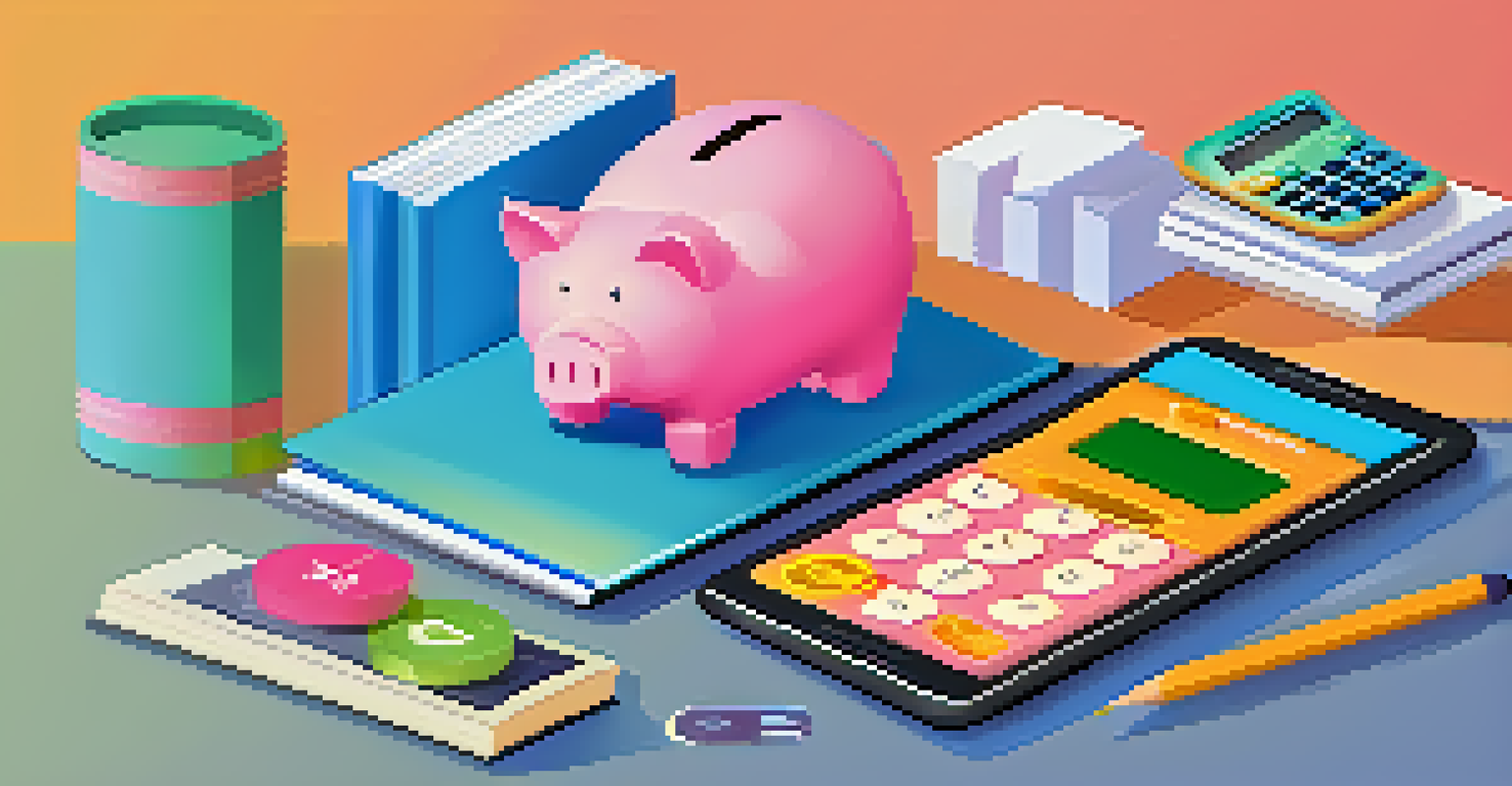Building a Personal Finance Toolkit: Essential Resources

Understanding the Importance of a Personal Finance Toolkit
A personal finance toolkit is a collection of resources that helps you manage your money effectively. Think of it as your financial Swiss Army knife, equipped with tools for budgeting, saving, investing, and planning for the future. Having a comprehensive toolkit can make navigating personal finance much easier and less overwhelming.
A budget is telling your money where to go instead of wondering where it went.
Just like a chef needs the right utensils to create a delicious meal, you need the right tools to build a secure financial future. This toolkit empowers you to make informed decisions, track your progress, and ultimately achieve your financial goals. It’s about taking control of your financial destiny, one tool at a time.
In the following sections, we’ll explore essential components of this toolkit, ensuring you’re well-prepared to tackle any financial challenge that comes your way. With the right resources at your disposal, managing your finances doesn’t have to feel like a daunting task.
Budgeting Tools: The Foundation of Financial Health
Budgeting is the cornerstone of personal finance, and the right budgeting tools can simplify this process. Apps like Mint or YNAB (You Need A Budget) allow you to track your expenses and income in real-time, helping you understand where your money goes each month. Having a clear picture of your finances can lead to better spending choices.

Think of budgeting as the GPS for your financial journey; it helps you navigate your way through expenses and savings. These tools often come with features that categorize your spending, set financial goals, and remind you of upcoming bills, which can significantly reduce financial stress. By using these resources, you can create a realistic budget that aligns with your lifestyle.
Building Your Finance Toolkit
A personal finance toolkit equips you with essential resources for budgeting, saving, and investing, simplifying your financial journey.
Ultimately, budgeting tools not only help you manage your money but also encourage you to develop healthier financial habits. As you gain control over your finances, you'll find it easier to save, invest, and prepare for unexpected expenses.
Saving Apps: Building Your Emergency Fund with Ease
An emergency fund is crucial for financial security, and using saving apps can help you build one efficiently. Applications like Qapital or Digit automate savings by analyzing your spending habits and transferring small amounts to your savings account regularly. This way, saving becomes a seamless part of your routine, almost like a stealthy ally in your financial journey.
An investment in knowledge pays the best interest.
Visualize your savings growing over time without feeling the pinch in your daily budget. These apps often allow you to set specific savings goals, whether it’s for a vacation, a new car, or just a rainy day. By gamifying the saving process, they make it feel less like a chore and more like a fun challenge.
Incorporating saving apps into your personal finance toolkit can help you develop a proactive mindset regarding your finances. With a solid emergency fund, you’ll feel more secure and confident in facing unexpected expenses that life throws your way.
Investment Platforms: Growing Your Wealth Wisely
Investing is a powerful way to grow your wealth, and investment platforms simplify this process for beginners and seasoned investors alike. Services like Robinhood or Betterment allow you to invest in stocks, ETFs, and other securities with ease. They provide user-friendly interfaces and educational resources to help you make informed decisions.
Think of these platforms as your personal financial advisors, guiding you through the complexities of the investment world. Many of them offer features such as automatic rebalancing and tax-loss harvesting, which can optimize your investment strategy over time. By taking advantage of these tools, you can set yourself up for long-term financial success.
Importance of Financial Goals
Setting clear financial goals provides direction and motivation, ensuring you stay on track toward achieving your financial aspirations.
As you incorporate investment platforms into your toolkit, remember that investing always carries risks. It’s essential to research your options and consider your financial goals before diving in. However, with the right resources, investing can be a rewarding experience that builds your financial future.
Credit Monitoring Services: Keeping Your Score in Check
Maintaining a good credit score is vital for securing loans and favorable interest rates, and credit monitoring services can help you stay on top of this. Tools like Credit Karma or Experian provide insights into your credit score, report any changes, and offer tips for improvement. Regular monitoring can help you catch errors or fraudulent activity early, safeguarding your financial health.
Imagine your credit score as a report card for your financial behavior; the higher the score, the better your chances of achieving your financial goals. These services often alert you to significant changes in your credit report, allowing you to take swift action if something seems off. This proactive approach can save you from potential pitfalls in the future.
Incorporating credit monitoring into your personal finance toolkit empowers you to take control of your credit health. By understanding the factors that influence your score, you can make informed choices about borrowing and spending.
Financial Education Resources: Knowledge is Power
Knowledge is one of the most valuable assets in your personal finance toolkit, and there are countless resources available to educate yourself. Websites like Investopedia and books like 'The Total Money Makeover' by Dave Ramsey provide valuable insights into budgeting, investing, and saving. By dedicating time to learn, you can make better, informed financial decisions.
Think of financial education as your training ground; the more you know, the better equipped you are to handle your finances. Online courses, podcasts, and even YouTube channels can offer diverse perspectives and strategies for managing money. This wealth of information can help demystify complex financial concepts, making them accessible to everyone.
Accountability for Financial Success
Incorporating accountability into your financial plan fosters support and motivation, helping you remain committed to your financial objectives.
As you build your toolkit, remember that financial literacy is a lifelong journey. By continuously seeking new knowledge and resources, you can adapt your financial strategies to changing circumstances and stay on the path toward financial success.
Setting Financial Goals: Mapping Your Path to Success
Setting clear financial goals is essential for creating a roadmap to financial success. Whether you want to pay off debt, save for a house, or retire early, having specific, measurable goals gives you something to strive for. Write them down and break them into smaller, manageable steps to keep yourself motivated and on track.
Think of financial goals as the destination on your journey; without them, you might find yourself wandering aimlessly. Regularly reviewing and adjusting your goals helps you stay aligned with your evolving financial situation and aspirations. This process gives you a sense of purpose and direction in your financial planning.

Incorporating goal-setting into your personal finance toolkit ensures that you’re not just managing your money but actively working toward a brighter financial future. With each milestone you reach, you’ll gain confidence in your financial decisions and the tools you use.
Staying Accountable: The Final Piece of Your Toolkit
Accountability is the final piece of your personal finance toolkit, helping you stick to your financial plan. Whether through a financial coach, support groups, or an accountability partner, sharing your goals with others can motivate you to stay on track. This support system can provide encouragement and constructive feedback as you progress.
Consider accountability as your financial cheerleader; they help keep you focused and motivated, especially during challenging times. Regular check-ins with your accountability partner can help you celebrate your successes and reassess your strategies when needed. The shared journey makes the process more enjoyable and less isolating.
By integrating accountability into your toolkit, you create a sense of community around your financial journey. With the right support and resources, you’re more likely to reach your goals and build a solid foundation for your financial future.